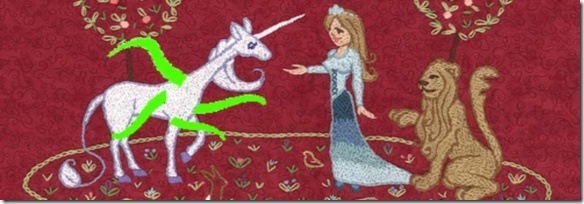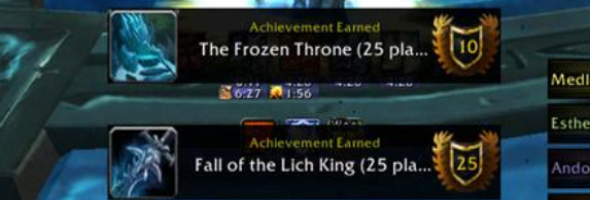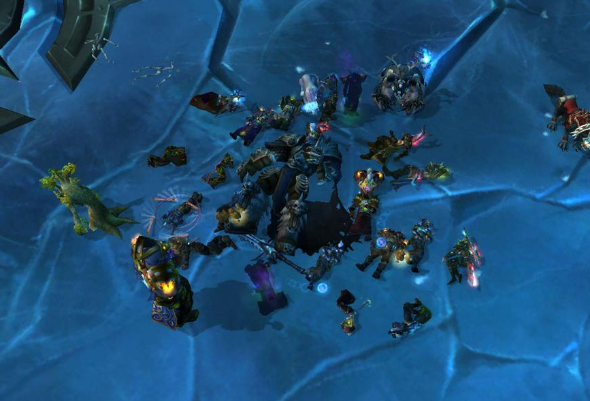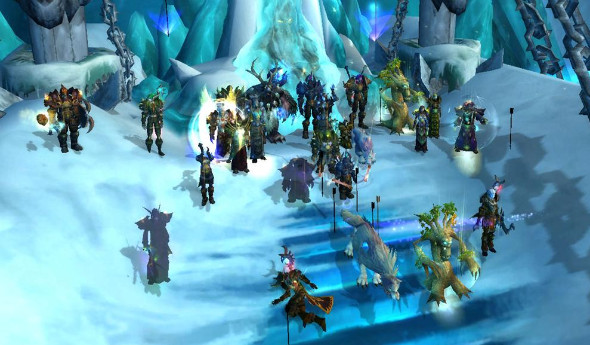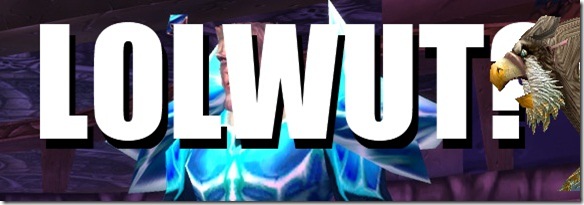Tobold’s post today is a refreshing look at how the holy trinity of tanks, healers and DPSers might be re-balanced. His basic concept is that it should be made more rewarding – more useful – to players to play a tank or a healer, for their own interest. Rather than developers assuming that the laws of odds and sods means that some players will play them because – well, someone has to.
Tobold’s correct in that tanks and healers could benefit from their ability to mitigate being more useful in solo combat. I’m not sure that in order to achieve this it would be necessary to make DPS classes “feel more like the proverbial glass cannon”. Combat could be customizable so that DPSers can still enjoy doing what they do best but tanks and healers can make their mitigation work for them.
Without giving it too serious thought early on a Monday I can think of some brief examples; there could be a mechanic whereby tanks reflect an increasing or scalable amount of monsters’ damage back at them (RPS – reflect per second?). The irritation here is that those monsters who are less damage oriented themselves would take longer to kill. Or there could be an improved “thorns” like mechanic – the idea behind thorns at present being that it does damage when thorns’ beneficiary is hit. The improved version (and the mechanic could be given to any class) could mean that effective use of a tank’s abilities gives him a stacking buff which then accordingly deals damage to the monster – which would stack all the more (and slightly insanely) in aoe/quest situations, probably making it great fun for tanks to quest by gathering all of the monsters on the continent at once. I exaggerate. Slightly.
But what are us healers going to do with our mitigation abilities? Ours is not so much mitigation as reparation. So what, we’d heal ourselves at monsters? Now we get to a deeper layer of difficulty for balancing the roles.
This is where the aforementioned concept of “their own interest” comes under scrutiny. In my mind a fighter’s – therefore a tank’s – interest in surviving battle is entirely different to a healer’s. The fighter charegs into battle wanting to smash those monsters in. Those fighters who are tanks also happen not to mind being smashed back by the monsters. A healer’s interest on the other hand is to hoppity-skip around the battlefield amidst volleys of arrows and magic from both sides in order to patch up their teammates.
The point at which their interest intersects is in doing what they are good at; and, trickily, those skillsets shine most in group situations when there are other people around to benefit from them. Not everyone can get hit over the head with as much class as a tank; and fighters going into battle alone traditionally aim to kill the betentacled unicorn quicksmart rather than let it try to tear their guts out for longer than is comfortable. As to healers – how many rogues do you see prancing around with happy light beams streaming from their fingertips? Healers like stapling peoples’ guts back in, and not just their own.
The difficulty here is reconciling two different experience types. First, redressing the game mechanic practicalities of playing a tank or healer to make it intrinsically self-rewarding for players choosing to play a tank or healer. And secondly, not amputating the traditional ideology behind the role types. The ideology which makes roles what they are; antecedents of cultural mythology celebrated through oral story telling, written classics, and role playing.
One way to approach this may be to remember that it’s not all about the roles. You can take the mechanic to the water but to make it drink from it – make the water more interesting. Perhaps the quest system could be overhauled – it’s overdue anyway.
Instead of quest givers parroting the a-typical “kill fish because I want their feathers to make a pair of sandals”, they could have a wider, more imaginative range of ways we can help them. Something like, “get from here to there in <insert arbitrary time limit> because, er, I dunno, how do you feel about couriering misunderstood baby murlocs? And do it the way that best suits you. You look healery, maybe hoppity-skip along and do your nature thing. You don’t have to slowly attack/tickle everything to death.”
Tell you what though. I remember several RPGs where us healers were the big guns when our band of heroes were wading through undead. Back in my day, undead monsters really didn’t like being healed at.
What do you think? How do you think class/role mechanics should be rebalanced on the ‘experience type’ graph, and why?
This is an article by Mimetir, an owl (and resto shaman) of a raid leader on The Venture Co. (EU) You can find my twitter feed here.
Article images originally on flickr, by Don Solo and merwing little dear.
